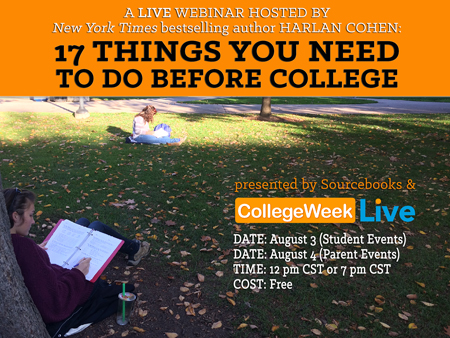 It’s no surprise the middle name of college-bound teens is “stress”. According to a recent survey, 76 percent of college-bound students say they are stressed. If you live with one, you’re stressed too; and not just you, but your family as well. Granted, there are plenty of reasons to be stressed. And plenty of reasons why it’s impossible to avoid feeling stress (try as you might). Add to the stress emotional teenagers and parents and you have volatile home environment.
It’s no surprise the middle name of college-bound teens is “stress”. According to a recent survey, 76 percent of college-bound students say they are stressed. If you live with one, you’re stressed too; and not just you, but your family as well. Granted, there are plenty of reasons to be stressed. And plenty of reasons why it’s impossible to avoid feeling stress (try as you might). Add to the stress emotional teenagers and parents and you have volatile home environment.
Following are 6 emotional college prep tasks and how to keep from freaking out. Yes, freaking out.
The Grades
Grades mean everything. Your student’s GPA is one of the most important components of the college application (if not THE most important). It’s understandable that your kid will stress over receiving B’s instead of A’s on their papers. They know that the college they want to attend looks at grades, classes, and GPA’s carefully before making an offer of admission.
What can you do? Create a positive study environment and don’t add to the pressure. If you see them struggling, get help. Let them know that all you expect from them is they do their best, nothing more.
The College Visits
Any parent who has been on a college visit with their teen will attest to the emotional roller coaster that often ensues. Your kid may balk at the thought of getting out of the car, cringe at the fact that his/her parents are there along with them, and freak knowing they have an interview scheduled.
What can you do? Take a chill pill before you head out and remember your kid is most likely terrified. This is a huge step for them and emotions are going to play a big part in the visits, even though you might see it as a critical step in the plan. Give them the freedom to express those emotions.
The Standardized Tests
Testing in itself is stressful. But standardized tests are incredibly stressful. It’s a timed test that affects the outcome of offers of admission. Scores are compared with other students and some consider them to be bragging material. A low score means less options for college; a high score opens more doors.
What can you do? Under no circumstances should you nag your student about studying. Help them study. Encourage them to study. Provide tutoring. If the pressure is off, they will do better on the tests. Too much pressure (especially from parents) with students who are stressed already, will affect their ability to focus and relax on test day.
The College Choices
Making decisions is stressful without the added pressure of the impact of this one decision on your kid’s future. They may act calm, cool and collected, but they feel the pressure to make the right college choices. The schools they choose will be evaluating them on their merit and overall success academically.
What can you do? Let them make their own choices. Guide but do not put your foot down and tell them they can only attend your alma mater or a college close to home. They need to make the choice themselves because they will be attending the college for the next four years. If they don’t like it, they won’t be happy and stay when struggles come.
The Money
Money concerns always produce mounds of stress. With the economy in disarray, that stress is compounded when families are trying to pay for college. When deciding on college choices, money should always be a factor. If your student knows what you can afford to contribute and what is expected of them, the stress will be minimal. Keep them in the dark and there could be added stress and disappointment when they apply to a school that is not financially doable.
According to The Princeton Review’s 2013 “College Hopes & Worries Survey”—an annual poll of college applicants and parents of applicants—stress levels are up while cost remains a driving factor in college selection. In fact, 79 percent said the state of the economy has affected their decisions about college—up 4 percent from 2012.
What can you do? Make time to talk about money with your kid. Hoping your student will get a full ride scholarship is not realistic. You need to plan for the worst (little or no aid) and hope for the best (multiple scholarships and merit aid). If the college choices fall into your family’s ability to pay, when the financial aid award arrives it will be a much more pleasant experience. Especially if lack of money to pay does not affect the final decision.
The Waiting
This is probably the most stressful time in your kid’s life, which means it is stressful for the parents as well. One student puts it simply:
Because as decision day draws closer, and the (rather strong) possibility of rejection becomes more and more pronounced, I can’t help but think that my process, that my life, is entirely out of my hands. I know it’s irrational — I know that I’m still the one who will make the ultimate decision, that I’m the one who will decide what my future holds. But that’s my point — I’m not rational anymore. I’m just afraid.
What can you do? Celebrate the accomplishment of applying and provide distractions during the months of waiting. Reiterate that you will be proud of them and no matter what the outcome it’s not the end of the world. Rejection is tough on these teens, but strong parent support can help them see that there are always options available and sometimes disappointments turn into blessings.
The ultimate goal is to have a stress free household and to avoid freaking out. This is probably impossible but keeping the “freaking” to a minimum will help your student reduce their stress. Stay calm and breathe. It will all be over soon.
____________________________
Wednesday’s child may be full of woe but Wednesday’s Parent can substitute action for anxiety. Each Wednesday Wendy and I will provide parent tips to get and keep your student on the college track. It’s never too late or too early to start!
The bonus is on the fourth Wednesday of each month when Wendy and I will host Twitter chat #CampusChat at 9pm ET/6pm PT. We will feature an expert on a topic of interest for parents of the college-bound.
Wednesday’s Parent will give twice the info and double the blog posts on critical parenting issues by clicking on the link at the end of the article from parentingforcollege to pocsmom.com and vice versa.









